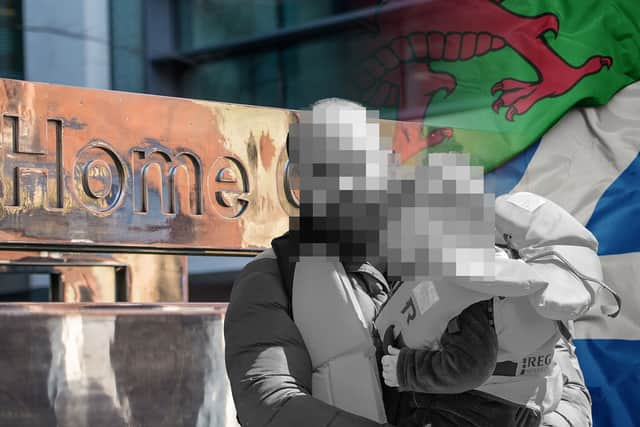Devolved nations slam Home Office for leaving top anti-slavery job vacant for almost a year amid migrant crackdown
and live on Freeview channel 276
The Scottish and Welsh governments have slammed the UK Home Office over its “unacceptable” failure to appoint a new anti-slavery and trafficking champion – almost a year after the role became vacant.
Holyrood said it is concerned about the resulting lack of scrutiny “at a time of extreme rhetoric and UK legislative proposals which will significantly impact victims of trafficking across Scotland and the wider UK”, while the Senedd said the Home Office is “failing to live up to its statutory duties” while at the same time pursuing “regressive” migration legislation.
Advertisement
Hide AdAdvertisement
Hide AdThe Independent Anti-Slavery Commissioner is a statutory role created by the 2015 Modern Slavery Act, with UK-wide responsibilities to promote “good practice in the prevention, detection, investigation and prosecution of slavery and human trafficking offences” and “the identification of victims”. They submit an annual report to Parliament, carry out research, and make recommendations to public bodies about how to tackle trafficking and slavery.
An investigation has previously exposed how the criminal justice system has failed to get on top of trafficking since the Modern Slavery Act was brought in – English and Welsh police brought no charges in over 19,000 modern slavery cases (95.6%) in the first five-and-a-half years after the Act was passed, while four in five suspects walked free from court. There were similar struggles in Scotland and Northern Ireland.
Dame Sara Thornton, the last person to hold the commissioner role, left office at the end of April 2022. The position has been vacant ever since, despite the Cabinet Office website previously stating final interviews would be conducted by 14 April last year, according to the charity Focus on Labour Exploitation (FLEX).
Government ‘appears to be acting unlawfully’
In November the Home Office told NationalWorld a “fair and open recruitment campaign” was underway. It had provided the same statement to the Guardian two months earlier. Human rights charity Liberty said at the time the government appeared to be acting unlawfully by stalling on the appointment.
Advertisement
Hide AdAdvertisement
Hide AdA job advert is now live on the government website – having been posted on 23 February, according to the Home Office – with a closing date of 23 March. A preliminary timeline states interviews are expected to end on 11 May, and while “the successful candidate will be encouraged to take up the appointment as soon as possible” there may be delays while security checks – which could take 4-6 weeks – are carried out. Ministers may also want to conduct further interviews after the recruitment panel has done theirs.
NationalWorld asked the Home Office why there had been a 10-month delay in posting the advert, but it gave no explanation.


While the post has been vacant, the UK government has passed the Nationality and Borders Bill 2022, which drew condemnation from slavery and human rights charities. Anti-Slavery International said the Bill had conflated “immigration enforcement with trafficking prevention and victim support” and was a backwards step.
The government this week unveiled its Illegal Immigration Bill, which will introduce automatic deportations for anybody arriving in the country through irregular channels such as boat crossings – including trafficking victims – and remove access to modern slavery protections. Home Secretary Suella Braverman repeated her claim that “modern slavery laws are being abused to block removals”, despite failing to answer continued calls from charities and human rights groups to provide evidence of this.
Grave concerns
Advertisement
Hide AdAdvertisement
Hide AdIn her last report published in April, Dame Sara Thornton was highly critical of the Nationality and Borders Bill, writing that she was “gravely concerned” about the consequences it would have on vulnerable slavery victims. She was also ‘alarmed’ to see sections of the Bill “fundamentally fail to grasp what being a victim of modern slavery means”.
A Scottish government spokesperson said: “The Modern Slavery Act 2015 requires the Secretary of State to appoint an Independent Anti-Slavery Commissioner.
“The role of commissioner is vital in taking an evidence-led approach to policy and legislative scrutiny and the slow progress over this appointment is unacceptable, particularly at a time of extreme rhetoric and UK legislative proposals which will significantly impact victims of trafficking across Scotland and the wider UK.”
A Welsh government spokesperson said: “It is disappointing the UK Government is failing to live up to its statutory responsibilities by allowing this important role to remain vacant for almost a year.
Advertisement
Hide AdAdvertisement
Hide Ad“Instead of pursuing the appointment of an Anti-Slavery Commissioner and a promised new modern slavery strategy, the UK Government has chosen to focus on regressive legislation like the Illegal Immigration Bill.
“We call on the UK Government to reconsider its approach and pursue a victim and survivor focused approach to modern slavery, in which safeguarding concerns are the primary focus.”
A Home Office spokesperson said: “This government remains committed to tackling the heinous crime of modern slavery, ensuring that victims are provided with the support they need to begin rebuilding their lives and that those responsible are prosecuted.
“The Home Secretary recognises the importance of the role of Independent Anti-Slavery Commissioner and has launched a new open competition to recruit for this role.”
Northern Ireland does not currently have a functioning government after a power sharing agreement broke down last year.
